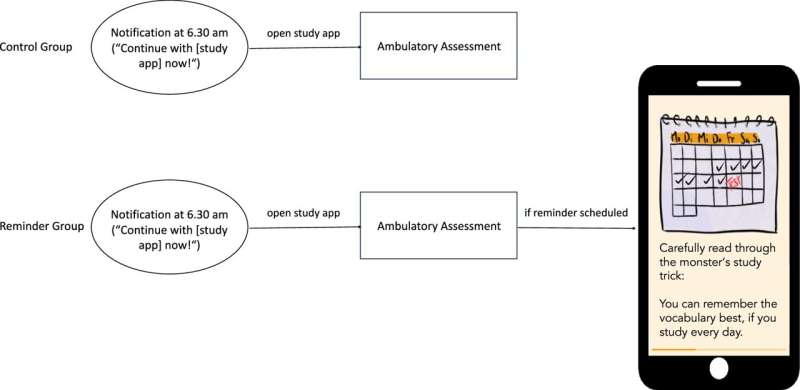This article has been reviewed according to Science X's editorial process and policies. Editors have highlighted the following attributes while ensuring the content's credibility:
fact-checked
proofread
Smartphone reminders found to have negative impact on learning times

Do smartphone reminders encourage pupils to engage regularly with learning material? Researchers at the DIPF | Leibniz Institute for Research and Information in Education investigating this question came to the conclusion that simple reminders such as push notifications tend to have a negative effect on learning times.
It is true that pupils learn more often on days when they are reminded than on days without reminders. Overall, however, a control group that was never reminded studied on more days. These findings are published in the journal npj Science of Learning.
"Smartphone reminders are very practical—they help us to drink more water during the day, remember birthdays and not miss any other appointments," explains Lea Nobbe, first author of the recently published article.
When it comes to learning, however, they are a double-edged sword: "The positive effect on learning behavior is rather short-term. In the longer term, pupils hand over responsibility for learning to the smartphone, with the risk that they will only rely on it."
A total of 85 children between the ages of 10 and 12 took part in the study. The researchers divided them into two groups and tracked their learning behavior over 36 days using the usage data of a vocabulary learning app.
The reminder group was reminded of learning up to 16 times at irregular intervals, while the comparison group received no such reminders. The researchers then evaluated how likely it is that pupils learn on days with and days without reminders.
This showed that the comparison group, which did not receive reminders, studied the vocabulary on 26 of the 36 days on average. In contrast, students in the reminder group only used the app on 22 days.
On days when their smartphone reminded them to study, the average probability of practicing was 69%, whereas on days without reminders it was only 60%. However, especially towards the end of the observation period, the students often only studied on the days on which they received a reminder.
In the control group, learning behavior also decreased after some time, but not as much as in the reminder group. In vocabulary tests, on the other hand, the students in both groups performed almost equally.
These results complement the findings from an earlier study by the same working group. According to this, special learning planning apps can certainly help to organize everyday life and learning. According to DIPF researcher Nobbe, it makes a difference whether it is a simple reminder, such as a push message, or whether the students develop individual learning plans or self-commitments for themselves in a suitable app and reinforce them with reminders.
"Overall, learning should be a habit and not be determined by reminders," says the psychologist. "The aim should be for students to develop the ability to find and apply learning strategies that suit them. Reminders can play a role in this, but should actually become superfluous over time because the learning process takes on a life of its own."
More information: Lea Nobbe et al, Smartphone-based study reminders can be a double-edged sword, npj Science of Learning (2024). DOI: 10.1038/s41539-024-00253-7
Provided by Leibniz-Institut für Bildungsforschung und Bildungsinformation





















